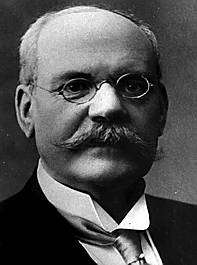Francis Hagerup
| Francis Hagerup | |
|---|---|
 | |
| Prime Minister of Norway | |
|
In office 22 October 1903 – 11 March 1905 | |
| Preceded by | Otto Blehr |
| Succeeded by | Christian Michelsen |
|
In office 14 October 1895 – 17 February 1898 | |
| Preceded by | Johannes Steen |
| Succeeded by | Emil Stang |
| Personal details | |
| Born |
George Francis Hagerup 22 January 1853 Horten, Norway |
| Died |
8 February 1921 (aged 68) Kristiania, Norway |
| Political party | Conservative |
| Occupation | Lawyer, politician, diplomat |
George Francis Hagerup (22 January 1853 – 8 February 1921) was a Norwegian law professor, diplomat and politician for the Conservative Party. He was Prime Minister of Norway from 14 October 1895 to 17 February 1898 and from 22 October 1903 to 11 March 1905. As a legal scholar, he is known for his contributions to the development of public international law, and was chairman of the Institut de Droit International. [1][2]
Biography
Francis Hagerup grew up at Horten in Vestfold, Norway. He was a son of admiral and cabinet minister Henrik Steffens Hagerup (1806–1859) and Nicoline Christine Jenssen (1808–1862). He graduated with the cand.jur. degree at the Royal Frederick University in 1876, received a grant to study abroad, and became a research fellow at the Royal Frederick University in 1879. He obtained the dr.juris degree in 1885, and was professor of law at the Royal Frederick University from 1887 to 1906. He was minister of justice in the Second cabinet Stang from 2 May 1893 to 14 October 1895. In August 1895 he was Finance minister. He was a member of the Storting from 1901 to 1906.[1]
He served as Prime Minister of Norway for two terms. First from October 14, 1895; secondly from October 22, 1903. In social policy, Hagerup's time as Prime Minister saw the passage of a child care law in 1896 that increased the power of local authorities and courts over neglected and abused children. Following his two bouts as Prime Minister, he served as ambassador to Copenhagen, The Hague, and Brussels. From 1916 he was ambassador in Stockholm. [3] [4] [5]
Hagerup was passionately involved in the development of public international law. From 1897 he was member of the Institut de Droit International, of which he became the chairman in 1912. In 1907 he headed the Norwegian delegation at the second peace conference in The Hague. He was also delegate at international conferences regarding admiralty law. In 1920 he led the Norwegian delegation when the League of Nations convened for the first time in Geneva. The same year he was elected to the Law committee under the League council. In 1888, he founded Tidsskrift for Retsvidenskab (Journal of Jurisprudence), and served as its editor until his death. [6]
Hagerup was also member of the Norwegian Nobel Committee from 1 January 1907 until his death in 1921. [7]
Personal life
He was married in 1880 to Frederikke Dorothea Bødtker (1853-1919). He died in Kristiania (now Oslo) and was buried at Vår Frelsers gravlund. [8]
References
- 1 2 Bodil Chr. Erichsen. "Francis Hagerup". Norsk biografisk leksikon. Retrieved April 1, 2018.
- ↑ Peter Macalister-Smith. "Institut de Droit international". Oxford University Press. Retrieved April 1, 2018.
- ↑ Foundations of the Welfare State, 2nd Edition by Pat Thane, published 1996
- ↑ "Francis Hagerups andre regjering". lokalhistoriewiki. Retrieved April 1, 2018.
- ↑ Knut Dørum. "Francis Hagerup". Store norske leksikon. Retrieved April 1, 2018.
- ↑ Harald Kjølås (12 March 2012). "Francis Hagerup". Allkunne. Retrieved April 1, 2018.
- ↑ "Francis Hagerup". Nobel Media AB. Retrieved April 1, 2018.
- ↑ "Francis Hagerup". lokalhistoriewiki. Retrieved April 1, 2018.
Other sources
- George Francis Hagerup biography at government.no (taken from Norsk Biografisk Leksikon - Norwegian Biographical Encyclopedia)
- Thane, Pat (1996) Foundations of the Welfare State (Longman Social Policy 2nd edition) ISBN 9780582279520
| Political offices | ||
|---|---|---|
| Preceded by Emil Stang |
Prime Minister of Norway 1895–1898 |
Succeeded by Johannes Steen |
| Preceded by Otto Albert Blehr |
Prime Minister of Norway 1903–1905 |
Succeeded by Christian Michelsen |